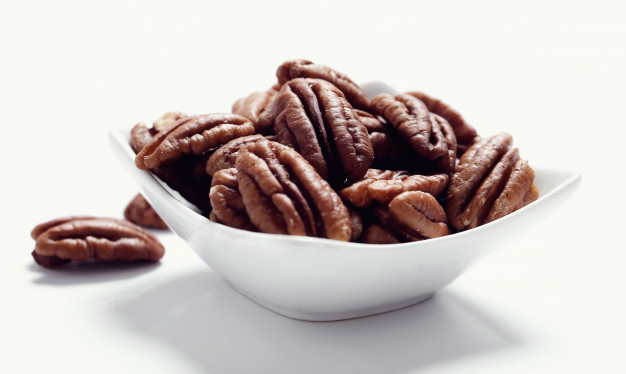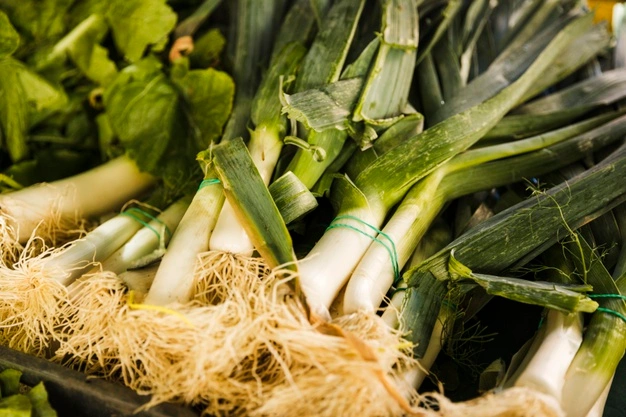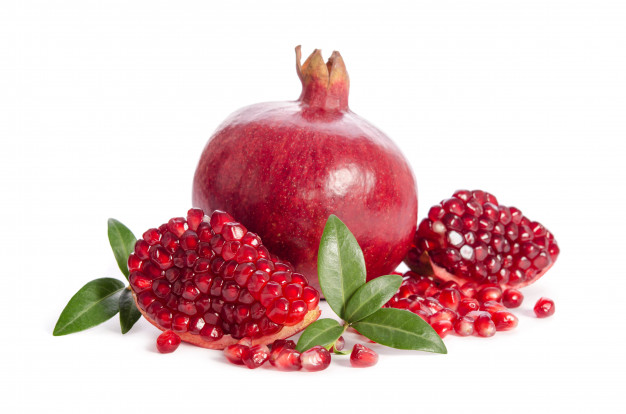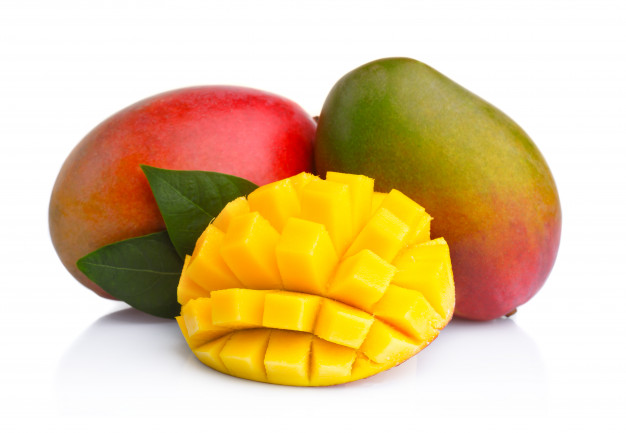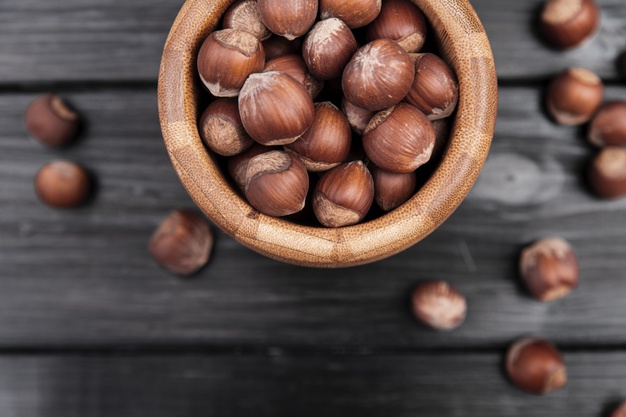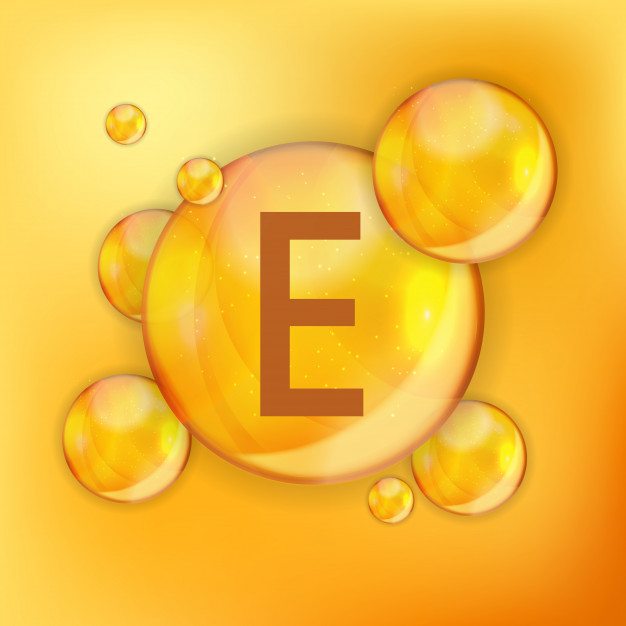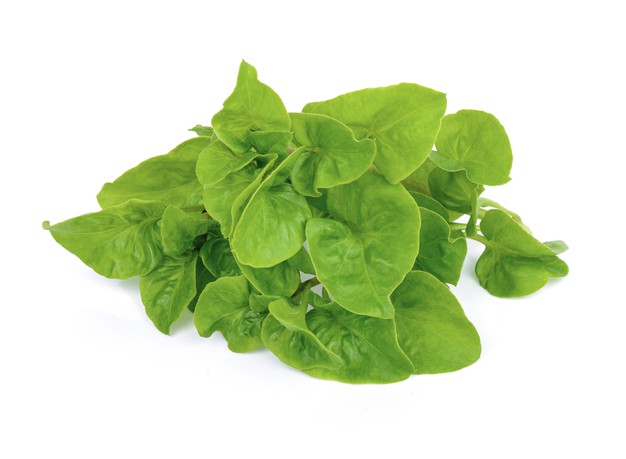Pecan is a delicious and nutrient dense nut native to Southern United States and Northern Mexico. It is well known for its sensory quality and health promoting activities. It is packed with MUFA, PUFA, polyphenolic compounds, antioxidants and micronutrients, which serve various important functions of the body.
Nutritional overview
- It contains very less amounts of carbohydrates though it contains desirable amount of dietary fibre
- It also contains some proteins
- It contains fat as well. It contains both saturated and unsaturated fatty acid (MUFA and PUFA) but does not contain any cholesterol
- It contains several vitamins, which include Vitamin A, Vitamin E, Vitamin C, Vitamin B1, B2, B3, B5, B6 and B9
- It also contains various minerals such as calcium, phosphorus, potassium, magnesium, zinc, manganese, iron and copper
- It is packed with phytonutrients, which include various monomeric as well as polymeric polyphenolic compounds. These phytonutrient components of pecan are responsible for showing significant nutraceutical activities, which help to prevent several chronic diseases
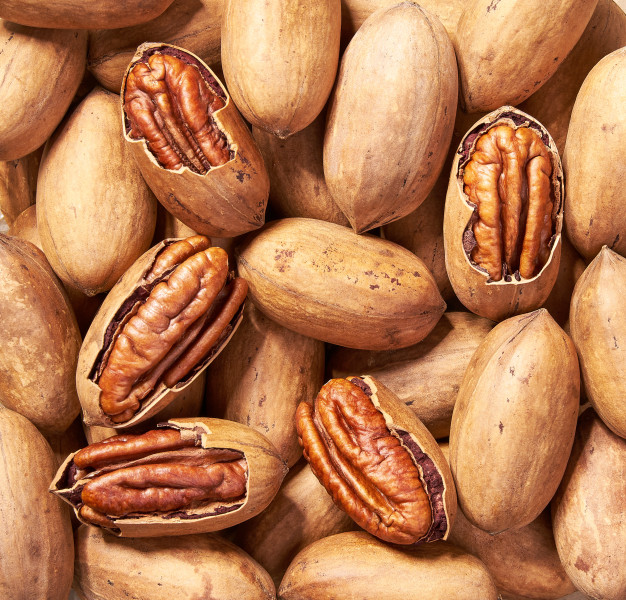
Biological property
Antioxidant activity
- Polyphenoic compounds (especially flavonoid) and vitamin contents of pecan are considered as principal compounds accountable for exerting antioxidant activities
- Its consumption is very effective for reducing the risk of developing chronic diseases as it helps to protect the body from oxidative damages
- It plays vital role in reducing the concentration of free radicals and reactive oxygen species within body thus helps to reduce oxidative stress
- It also helps to promote cellular functionality by protecting cells from injuries and damages

Anti-inflammatory activity
- Consumption of pecan is extremely beneficial for inhibiting the onset of inflammatory events within body and significantly reduces the prevalence of inflammatory diseases
- Pecan contains desirable amount of magnesium, which plays essential role in preventing inflammation by reducing the concentration of inflammatory indicators within body
- It is also associated with inhibiting swelling and pain
Antimicrobial activity
- It helps to inhibit the growth as well as reproduction of microbes within host and protects the body from the harmful consequences of infectious diseases
- It especially exhibits its antimicrobial activity against Listeria monocytogenes, Bacillus cereus, Staphylococcus aureus and Vibrio parahaemolyticus
Anti-carcinogenic activity
- Consumption of pecan significantly reduces the susceptibility of cancers
- This nut is packed with ellagic acid, which has strong anti-proliferative property that helps to prevent the proliferation of cancerous cells
- It also helps to inhibit the binding of carcinogenic compounds (such as polycyclic aromatic hydrocarbons, nitrosamines etc) to DNA and prevents DNA damages, which helps to decrease the prevalence of cancers as well
- It is also associated with preventing gene mutation (considered as an important causative factor of cancers)
- Consumption of pecan especially reduces the prevalence of breast and colon cancer

Health benefits
Role on immunity
- It plays significant role in strengthening the defense mechanism of body
- Its phytonutrients, antioxidants and vitamin contents are responsible for boosting up the immunity
- It also contains significant amount of zinc, which plays crucial role in promoting the growth, development and functionality of immune cells
- It helps to enhance the resistant power of body as well hence increases diseases fighting ability
Role on digestive health
- Indigestion is a very common problem experienced by a wide range of individual, which causes severe abdominal discomfort and heart burn. Pecan should be consumed for overcoming this digestive issue as it helps to promote digestion of food as well as absorption of nutrients
- Its fibre content plays significant role in enhancing bowel movement that promotes regularity
- It is also associated with increasing colonic motility that helps to move the food materials effectively through colon thus clean the gastrointestinal tract
- It plays important role in preventing various gastrointestinal diseases such as constipation, hemorrhoids, diverticular disease and ulcerative colitis
Role on weight management

- Individual who want to reduce their body weight should include pecan in their diet
- Its fibre content is associated with providing a feeling of satiety that helps to reduce hunger hence decreases excess food consumption, which ultimately facilitates weight reduction
- It is associated with increasing the catabolic rate of body that also aids in weight reduction
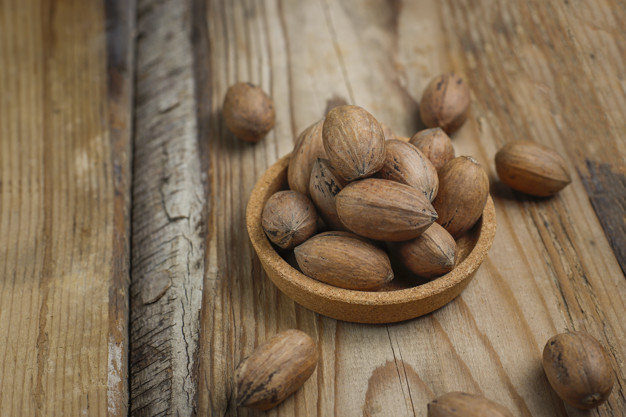
Role on nervous system
- It is very helpful for protecting nerve cells from inflammatory damages and prevents the susceptibility of developing neurological disorders
- Its thiamine and copper content are closely related with delaying the onset of Parkinson’s disease
- Its Vitamin B6 content also helps to promote the functionality of brain
- It is packed with antioxidants (mentioned above), which help to protect the brain from free radical induced oxidative damages thus improves the functions of central and peripheral nervous system
- Manganese is another important trace element found in pecan plays significant role in stabilizing the synaptic process of brain
- Consumption of pecan is very effective for reducing the prevalence of epilepsy, Alzheimer’s disease, mood swings and learning disabilities
Role on skin
- Zinc, phosphorus and folic acid contents of pecan play significant role in maintaining good skin
- Its Vitamin A, Vitamin E and Vitamin C components act as potent antioxidant, which help to protect the skin from oxidative damages and prevent ageing
- Fibre content of pecan helps to eliminate waste product as well as toxins from body, which helps to improve the appearance of skin
- It is very effective for preventing the prevalence of wrinkles, fine lines, pigmentation and dermal infections

Role on hair
- Pecan contains desirable amount of L-arginine (amino acid), which plays crucial role in promoting hair growth. It has seen that arginine is extremely effective for treating baldness
- It is also associated with enhancing blood circulation throughout the body. So it also helps to improve the supplying of blood to hair roots that promotes hair growth
- It helps to make the hair strengthen
- It helps to reduce hair loss and breakage
Therapeutic applications
- It plays significant role in reducing blood sugar concentration hence it is a healthy choice for diabetic patients
- Its consumption is very effective for improving the symptoms of Premenstrual syndrome
- As it contains desirable amount of calcium and phosphorus hence its consumption is considered as extremely beneficial for strengthening the skeletal system. It helps to increase bone mineral density and reduces the prevalence of osteoporosis especially in women
- Individual suffer from arthritis should consume pecan as it has strong anti-inflammatory activities, which ultimately helps to prevent joint swelling as well as pain and also helps to improve joint functions
- It helps to decrease the concentration of bad cholesterol (LDL) within body whereas increases the level of good cholesterol (HDL)
- Its antioxidant, polyphenolic compounds and MUFA (especially oleic acid) contents are accountable for promoting cardiac health. It helps to reduce the risk of developing atherosclerosis, coronary heart diseases, strokes and heart attacks

General consideration of using Pecan
- It can be utilized as a topping substance for salad
- Baked fish or meat or chicken can be consumed with pecan crust
- It can consumed with whole grain muffins or pancakes or cookies or pies or casseroles
Risk factors
Consumption of too much pecan may develop gastrointestinal disturbances like indigestion, flatulence, diarrhoea and stomach cramps. It’s over consumption may also leads to obesity thus it is better to consume it in moderate quantity.

Source:
Atanasov, A.G., Sabharanjak, S.M., Zengin, G., Mollica, A., Szostak, A., Simirgiotis, M., Huminiecki, Ł., Horbanczuk, O.K., Nabavi, S.M. and Mocan, A., 2018. Pecan nuts: A review of reported bioactivities and health effects. Trends in food science & technology, 71, pp.246-257.
El Hawary, S.S., Saad, S., El Halawany, A.M., Ali, Z.Y. and El Bishbishy, M., 2016. Phenolic content and anti-hyperglycemic activity of pecan cultivars from Egypt. Pharmaceutical Biology, 54(5), pp.788-798.
Flores-Cordova, M., Muñoz-Márquez, E., Muñoz-Márquez, E., Ojeda-Barrios, D.L., Soto-Parra, J.M. and Preciado-Rangel, P., 2017. Phytochemical composition and antioxidant capacity in Mexican pecan nut. Emirates Journal of Food and Agriculture, pp.346-350.
Flores-Córdova, M.A., Sánchez Chávez, E., Chávez-Mendoza, C., García-Hernández, J.L. and Preciado-Rangel, P., 2016. Bioactive compounds and phytonutrients in edible part and nutshell of pecan (Carya illinoinensis). Cogent Food & Agriculture, 2(1), p.1262936.
Gardea, A.A., Martínez-Téllez, M.A. and Yahia, E.M., 2011. Pecan (Carya illinoiensis (Wangenh.) K. Koch.). In Postharvest biology and technology of tropical and subtropical fruits (pp. 143-166e). Woodhead Publishing.
Haddad, E.H., 2011. Health effects of a pecan [Carya illinoinensis (Wangenh.) K. Koch] Nut-rich Diet. In Nuts and Seeds in Health and Disease Prevention (pp. 891-898). Academic Press.
